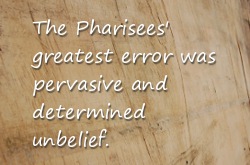Review: "The Hole in Our Holiness"
[amazon 1433533340 thumbnail]
Reposted, with permission, from Theologically Driven.
A few months ago I expressed some fairly strong reservations about a nefarious variation of “Gospel-Centered” sanctification that has captured the attention of a number of conservative evangelical luminaries—a preach-the-Gospel-to-yourself, squeeze-your-eyes-tight-and-think-really-hard-about-justification method of propelling oneself to holiness without any discipline, self-denial, effort, or obedience (cuz that’s how them legalists do sanctification).
In this post, I’d like to put on a happy face and make a positive recommendation of an accessible, contemporary, evangelical work that captures a much more holistic picture of the Bible’s teaching on sanctification—a book that does not neglect the motivating role of justification in personal holiness, but one that concentrates more promisingly on regeneration as the energy that fuels personal holiness.
In his book The Hole in Our Holiness, Kevin DeYoung argues that the Gospel involves more than a new standing in Christ; it also involves a new creation. And when we emphasize the former to the neglect of the latter, personal holiness inevitably suffers. This is the hole in our holiness. It starts as a noble effort to rid justification of every vestige of good works, but expands to “assume that good works will invariably flow from nothing but a diligent emphasis on the gospel,” and culminates in a bad case of “nomophobia” or the fear of laws (p. 55). People with this disorder, DeYoung suggests, “make every imperative into a command to believe the gospel more fully … and faith becomes the one thing we need to be better at. If only we really believed, obedience would take care of itself. No need for commands or effort.”
 Published previously at SharperIron on January 7, 2011.
Published previously at SharperIron on January 7, 2011. Used with permission from
Used with permission from  Read
Read  First posted October, 2009. Discussion
First posted October, 2009. Discussion 
Discussion